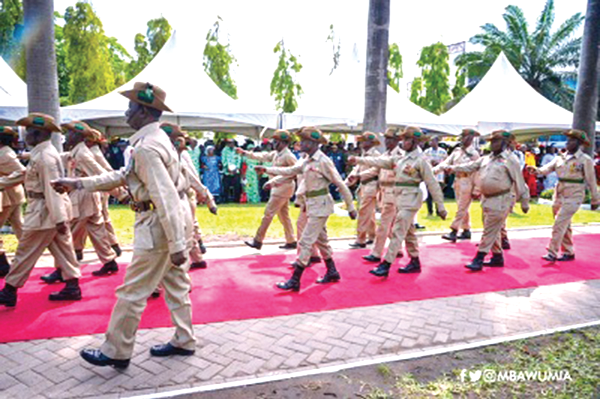
Remembrance Day: ‘Eleven-eleven’ & poppy!
Armistice-Day, later Remembrance-Day is on November 11. It marks the day WW1 officially came to an end at 11am on the 11th day of the 11th month of 1918.
In Ghana, Remembrance-Day is held on November 11 annually to honour or remember servicemen who died fighting.
Soon, it will be another “eleven-eleven”. Remembrance-Day Parade is significant not only in Ghana, but the world over.
So, what is“11-11” and what is its connection with the Poppy flower?” Before then, a recollection of my first experience with “11-11” in 1974.
Black beret
Soon after arriving home from Canada as a young second-lieutenant (2/Lt) in the Armoured Reconnaissance (Recce) Regiment, I was tasked to participate in the Remembrance-Day Parade at the Black Star/Independence Square.
Years later, the venue would be moved to the Christiansborg War-Memorial, Osu.
On my first day at rehearsals, I unexpectedly ran into trouble.
The Parade Commander, an infantry Major, asked why I was in my regimental black beret, and not in the “CAP SD” (aka ‘Officers’ Cap),” like the other officers.
“Sir, I am a Recce Officer and we wear our black berets for parades,” I replied. What I thought was an innocent answer rocketed the Major to space!
“Nonsense!” he yelled! “You little day-old-chick Second-Lieutenant! You want to teach me military tradition telling me you can wear beret for a parade because you are a Recce Officer? If you appear here tomorrow in that beret, I will charge you!”
On returning to my regiment, I informed my Squadron Commander who reassured me I was right.
At the next rehearsal, the Parade Commander said nothing to me even though I was in my black beret.
I suspected the two Majors had dialogued.
World War 1
WW1 was fought between 1914-1918 during which about 20 million lives were lost.
Fighting as the British-West-African-Frontier-Force (BWAFF), soldiers from the British colonies of Gold Coast, Gambia, Nigeria and Sierra Leone fought against the Germans in Cameroons.
During WW2 from 1939-1945, the 81st and 82nd Divisions of the1929-redesignated Royal-West-African-Frontier-Force (RWAFF) fought in Italian-Somaliland, Abyssinia and Burma.
What caused WW1?
At the beginning of 20th Century, Europe was polarised into two camps.
The Triple-Entente comprised Britain, France and Russia, while the Triple-Alliance was made up of Germany, Italy and Austria.
Serbia had a bilateral defence pact with Britain which made her a de-facto member of the Triple-Entente.
While visiting Serbia in June 1914, Crown prince Archduke Franz Ferdinand of Austria was assassinated by Serbian nationalists.
The Entente demanded the extradition of the criminal Serbs for trial. The Alliance refused, providing the spark/immediate-cause for WW1.
However, a major remote cause was the Scramble for Africa’s natural resources after the 1884-1885 Berlin Conference, organised by German-Chancellor Otto-von-Bismarck, which shared Africa among the 13 European states and USA.
This was a reaction to King Leopold the Second of Belgium carving out vast Congo as his private property in 1876.
During the Napoleonic wars in the early 19th Century, red poppy flowers unnaturally grew around the bodies of fallen soldiers on barren or rocky lands.
Poppies were thus seen as a symbol of hope and restoration. In late 1914, the fields of Northern France and Flanders, (the Dutch-speaking Flemish region of Belgium) were ripped open by fighting.
Again, red poppies grew!
The red petals symbolised the blood of the fallen soldiers, while the black interior symbolised the pain in the hearts of their families/friends.
The poppy, thus, became the enduring symbol of remembrance of WW1. It also symbolised sleep or peace or death.
Lt Col McCrae
Canadian soldier, poet and surgeon, Lt Col John McCrae, is credited with popularising the poppy in his three-stanza poem In Flanders Fields.
“In Flanders fields the poppies blow
Between the crosses, row on row
That mark our place in the sky
The larks, still bravely singing, fly
Scarce heard amid the guns below”
McCrae wrote this poem on May 3, 1915 after presiding impromptu, in the absence of the chaplain, over the funeral of his friend Lt Alexis Helmer.
The poem described the carnage and horrors of war.
Touched by the poem, an American lady, Moina Michael, decided to make and sell silk-poppies to raise funds to support wounded soldiers.
Sent to England in 1921 by a Frenchwoman, Anna Guerin, the poppies immediately sold out with thousands of pounds realised to support veterans.
Ghana - Remembrance Day 2021
Around November 11, every year silk or paper poppies are sold all over the world to support veterans.
In Ghana, the Veterans Administration of Ghana (VAG) is responsible for all matters about veterans and organises the annual “11-11” parade at the War Memorial Cenotaph, Osu.
Proceeds from the sale of poppies go to support veterans’ activities for old or frail ex-servicemen.
As you buy poppies this year, remember it is for a worthy cause. Leadership, lead! Fellow Ghanaians, wake up.
The writer is Former CEO, African Peace Support Trainers Association, Nairobi, Kenya & Council Chairman, Family Health University College, Accra, E-mail: dkfrimpong@yahoo.com
